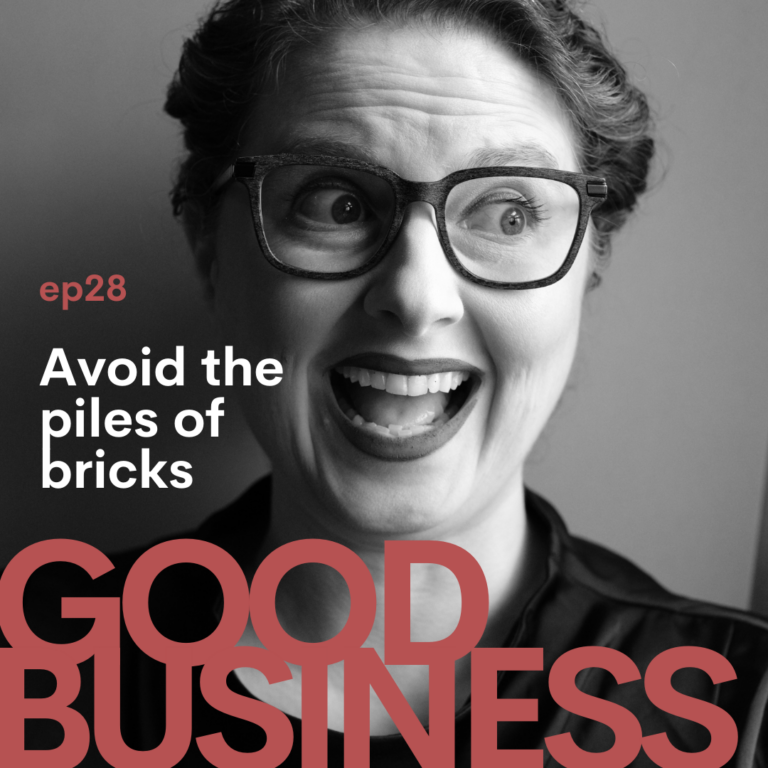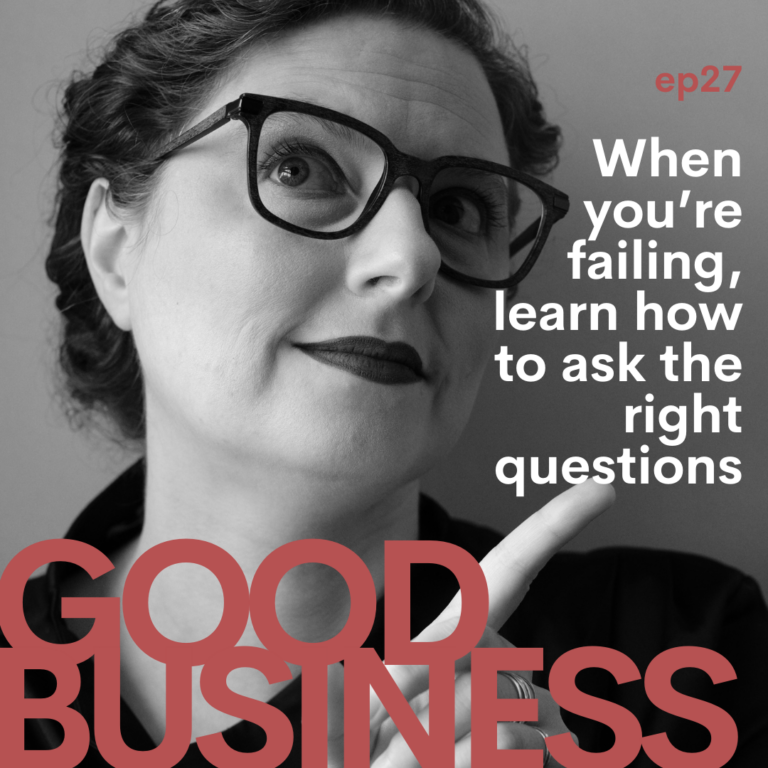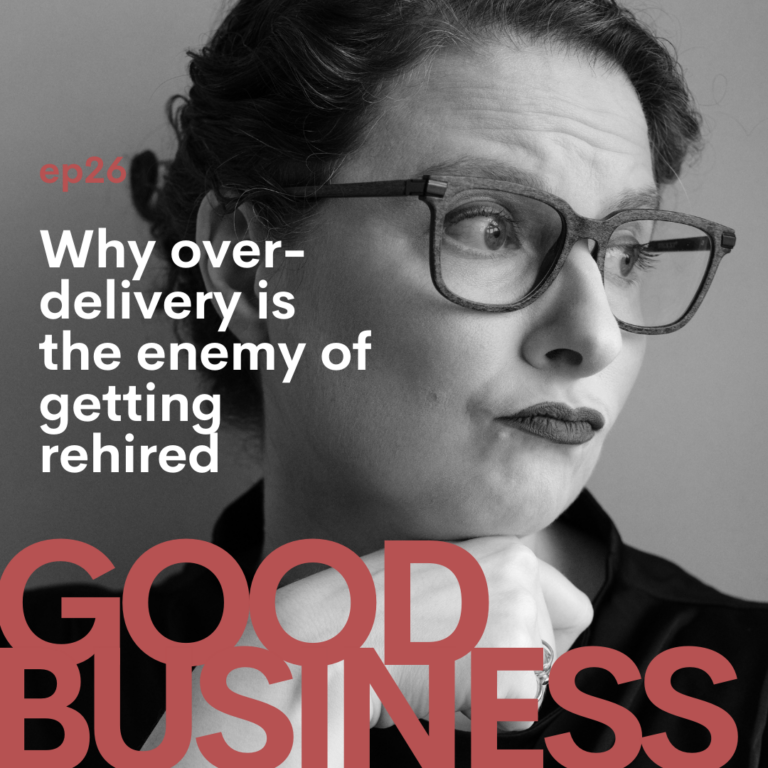What is “asynchronous income”?
In this episode, I talk about why passive income is a total misnomer, the difference between passive and asynchronous income, and what you can find in the middle between (the myth of) passive income and exchanging dollars for hours.
Find out how we define asynchronous income and whether or not it’s right for your business.
How could you create asynchronous income streams to allow you to flatten out your income so there are fewer peaks and valleys?
Episode Transcript:
Welcome back to The Good Business Podcast. I’m your host, Illana Burk. And today I wanna talk about something super fun. I wanna talk about the difference between passive income and asynchronous income. Now, asynchronous income is a term that I am coining right this second. It actually came from a client call recently and, my client and I both thought it was brilliant, humbly.
So I’m gonna tell you about it. We were talking about how passive income is such a misnomer. Now this is something that comes up again and again, in online business spaces where it’s like the idea of, “create passive income”. And we all know that’s a fucking joke because there’s nothing passive about passive income.
It requires a ton of maintenance. It requires a ton of setup. It requires a ton of thinking. It requires ads and inputs and investment. It just doesn’t happen, where you give someone dollars for hours. So that’s what makes it passive apparently. But I don’t know anybody who makes money off of that kind of model, who would regard it as passive.
So that’s the starting point for this conversation. The end point though, is what is the difference between that, and asynchronous income? Now asynchronous Income is the different, it’s the space between that one end of the spectrum of I create things and then they make money while I’m sleeping, and I create bespoke engagements with people that are highly customized and require my presence.
There’s a middle thing in between, and that’s asynchronous income. Meaning you create something, you offer it, and your income is coming in at a different pace than what you’re deliver. Now, this is super common in all kinds of ways. You just don’t really think about it. So we’re talking about ways to articulate and identify when this is happening and what it means.
Essentially asynchronous means that it’s like what you’re giving and what you’re getting are not really synced up. So if you’re providing a course, for example, on a certain schedule, but your income is coming in over the course of a year, that could be done through a payment plan, right?
Let’s say you offer a course for $2,000 and you offer a year long payment plan. You’re gonna get a few hundred dollars a month long after the course is over often. Right. That would be more of an asynchronous income model.
There’s a lot of ways to think about asynchronous income. It could be that you create something that you can offer repeatedly, but that requires you to show up in small bursts and then your income could be all at once. It could be over time, but it’s not in sync with what you’re offering. The benefits of asynchronous income is that it allows you to deliver bespoke experiences while experiencing the upside of passive income.
So asynchronous income is what happens when you trust people. Honestly, payment plans are one of the best examples of this. Because offering extremely long payment plans is something a lot of business owners reject the concept of, because they think they’re gonna get ripped off.
I have found in almost 15 years of doing this, that that is simply not true if you deliver well. If you don’t deliver well, that’s a whole other story. If you have lots of people asking for refunds or stiffing you on payment plans, you should be turning the mirror on yourself, which is a whole other podcast episode.
But in reality, let’s say that you are all very, very good at what you do. You don’t get that. Right? People pay their bills. You ask them to trust you. You trust them. They pay their bills and you end up with income long after you’ve delivered on your promise.
So think about what you can do in your business to create asynchronous income.
Can you offer longer payment plans to make your work more accessible to more people? Can you create something that can pay dividends over time? Can you put things out to the world that are out of sync with when you might make money from it? There’s a lot of creative ways to do this. So think about what those ways are in your business, right?
It could mean… I use jewelry designers as a common example here. So I’m gonna keep with the theme. Let’s say you are a jewelry designer and you need to make X amount of dollars every year in order to make your nut. You could be offering those as a, as a normal shop where you’re always hustling, you’re always promoting, you’re always marketing and you’re always selling. And you’re always kind of striving and struggling and the money trickles in when you sell something.
But what if you offered a sale a couple of times a year? And instead of all of the money coming as you make things, meaning trading dollars for hours in a more real time experience, more traditional model, what if you offered the things as a individual auction time? Or you open your store up for an abbreviated amount of time and you offer payment plans on your largest, most expensive pieces.
So what that could result in is, you make a whole lot of money all at once, or you even offer payment plans for things that people can pay over time. Or throughout the year, you could be offering a layaway program. As you create new pieces, you could be sending them out to your mailing list and saying, Hey, here’s what I’m working on. If anybody would like to begin to pay it off, you can reserve it now.
And then you’re getting income before it’s ever sold and making something accessible to a whole new audience of people that might not be able to afford it when it’s a $5,000 piece, but they might be willing to pay $500 a month or something for it.
So asynchronous income can come in all different forms like that. It can come from individual sales, it can come from payment plans. It can come from offering something that’s always available, like on evergreen, for example, but changing up how you charge for it.
You could offer a longer payment plan, a shorter payment plan. You could offer something that you have to show up for, for an abbreviated amount of time, or that you have to pull out from at a certain point in time.
So think through your business and think about how you could create asynchronous income streams that are not entirely passive and that don’t completely change the shape of what you deliver, but will allow you to flatten out your income on an ongoing basis so that you have less peaks and valleys.
All right, everybody, I look forward to our next episode. Have a great day. Bye.
More Episodes
Why you shouldn’t start a membership site | GB31
Today's episode is all about how to look a little closer at the ever-growing trend of membership sites all over the place and how to know if you should jump on the bandwagon or not. Episode Transcript: I'm Illana Burk, CEO of...
Four not shocking disappointments in a time of crisis | GB30
Today’s episode is about the simple idea that your business exists not just to support you and your stakeholders, but to support your community.
Be of service and don’t be a sh*thead | GB29
Today's episode is all about how to not be a jerk in the middle of a crisis. Episode Transcript: I'm Illana Burk, CEO of Your Life's Workshop, coach to entrepreneurs and solopreneurs across dozens of industries and host of Good...
Avoid the piles of bricks | GB28
Today, we talk all about that craptastic feeling of being buried. Underwater. Crushed by the weight of big ideas, neverending task lists, and elephant-sized goals. First, we’ll talk about what this really means and the ways in which this feeling tends to show up, along with a little on how we tend to behave as a result. Then we’ll talk about a simple way to handle these moments better. And finally, we’ll wrap up with a healthy pep talk.
When you’re failing, learn how to ask the right questions | GB27
Today’s episode is all about how to not shoot yourself in the foot right out the gate. I’m gonna break down one very common mistake that newbies (and non-newbies) make and how to fix it. Today, we learn how to ask for help and guidance in a way that doesn’t completely fuck up your chances of getting what you ACTUALLY need, which is respect.
Why overdelivery is the enemy of getting rehired | GB26
Today’s episode is all about why over-delivering is a really good way to not get asked back for more work. We all think doing our best and giving more than people asked for is a good thing. And in some ways, it is. Things like adding extra value to something you do is fine. What I’m talking about is when you completely blow the scope of what was asked of you out of the water. It’s one of the hardest things to identify when you’re trying to figure out why no one seems to hire you twice.






